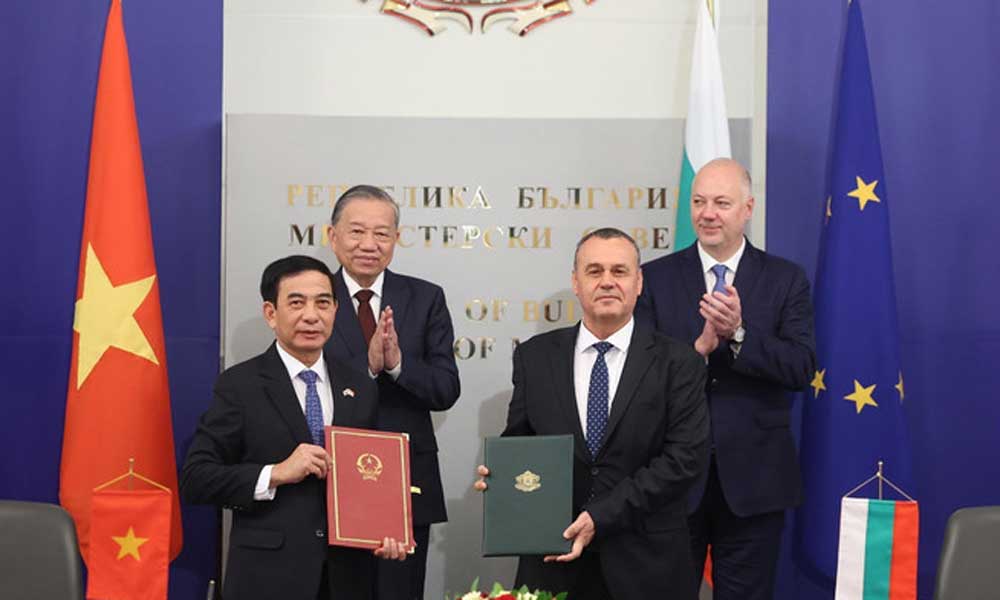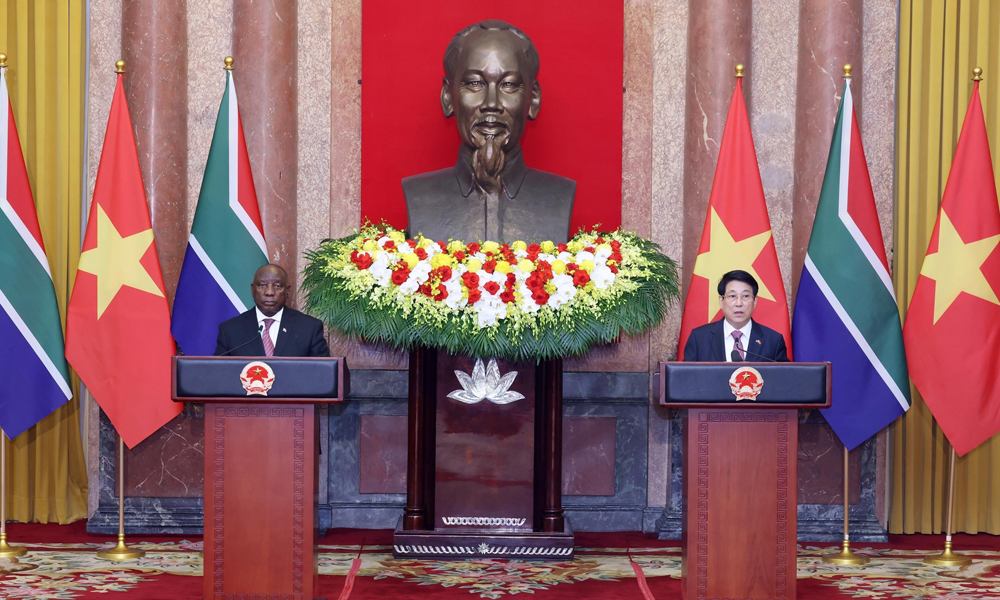PM Pham Minh Chinh attends plenary and retreat sessions of 47th ASEAN Summit
Speaking at the summit, PM Chinh emphasised that “inclusivity and sustainability” are the strategic choice and requirement of the Association of Southeast Asian Nations (ASEAN), and suggested the regional bloc strongly promote three sources of strategic strength.
Vietnamese Prime Minister Pham Minh Chinh and leaders of ASEAN countries on October 26 attended the Plenary Session and the Retreat Session of the 47th ASEAN Summit chaired by Malaysian Prime Minister Anwar Ibrahim.
 |
|
Prime Minister Pham Minh Chinh attends the 47th ASEAN Summit's Plenary Session and the Handover Ceremony of the Second Protocol Amending the ASEAN Trade in Goods Agreement (ATIGA). |
Speaking at the summit, PM Chinh emphasised that “inclusivity and sustainability” are the strategic choice and requirement of the Association of Southeast Asian Nations (ASEAN), and suggested the regional bloc strongly promote three sources of strategic strength.
Before the discussion, ASEAN leaders listened to presentations from the Chairman's guests, including Canadian Prime Minister Mark Carney, President of the European Council Antonio Costa and Managing Director of the International Monetary Fund (IMF) Kristalina Georgieva.
In their speeches, they all shared the challenges facing the world, and highly appreciated the role, position and achievements of ASEAN in recent times, considering ASEAN as one of the models of multilateral cooperation, and at the same time, proposing many priorities and measures to further strengthen cooperation.
Georgieva said that if ASEAN continues its current approach - in which it prioritises institutional reform, supports private economic development, increases intra-regional trade and with partners, especially completely removing tariffs - it can help increase the region's GDP by 4.3% and create 4 million new jobs.
ASEAN leaders shared their appreciation for the important and multifaceted achievements made during Malaysia's Chairmanship Year, aiming to build a sustainable and inclusive community, promote free trade, capital and human resource flows, as well as continuously expand and deepen relations with partners, including the signing of the Protocol to upgrade the ASEAN-China Free Trade Area 3.0 and promote the Regional Comprehensive Economic Partnership Agreement (RCEP).
At the same time, the leaders also shared about the difficulties, challenges and non-traditional risks that countries are dealing with such as climate change, natural disasters, epidemics, transnational crimes, and social shortcomings such as poverty, inequality, and increasing gap between rich and poor.
Accordingly, the leaders highlighted the importance and determination to effectively implement the ASEAN Community Vision 2045 and the approved strategic plans, towards building a united, self-reliant, and dynamic ASEAN Community with people at the centre; at the same time, continue to prioritise cooperation to narrow the development gap, promote inclusive and sustainable development, accelerate digital transformation and address challenges related to climate change, thereby enhancing collective resilience for the region.
The leaders also emphasised the need for ASEAN to maintain solidarity, promote its central and leading role to continue contributing to peace and stability in the region.
ASEAN needs to continue to deepen existing partnerships, as well as actively consider and expand relations with new partners.
In the international arena, ASEAN needs to continue to promote multilateralism, affirm the role of regional mechanisms in the process of promoting dialogue, cooperation, building trust, and promoting the role, voice and common contributions of ASEAN in handling global issues.
The leaders also affirmed to continue to support and assist Timor-Leste in fulfilling its obligations and membership criteria, fully and effectively integrating into regional cooperation.
Regarding international and regional issues, the countries welcomed the signing of the peace deal between Cambodia and Thailand, affirming that they will actively participate in and support the effective implementation of the agreements.
The countries highly appreciated the role and efforts of the Chair of Malaysia in promoting the implementation of ASEAN's 5-point Consensus on Myanmar; agreed that the Consensus continues to be the main direction for ASEAN's engagement efforts in the coming time, with priority given to ceasefires and cessation of violence, resumption of dialogue and deployment of humanitarian aid to the people.
Regarding the East Sea, as the situation continues to see complicated developments and incidents, the countries emphasised the importance of maintaining solidarity, unity and common stance of ASEAN on the East Sea issue, affirming efforts to fully and effectively implement the Declaration on the Conduct of Parties in the East Sea (DOC) and soon reach an effective and substantive Code of Conduct (COC) in accordance with international law, including the 1982 United Nations Convention on the Law of the Sea (UNCLOS).
Speaking at the summit, PM Pham Minh Chinh congratulated PM Anwar Ibrahim and Malaysia on the important achievements they have made in the ASEAN Chairmanship Year 2025, the year that kicks off the journey to realise the ASEAN Community Vision 2045.
Warmly congratulating Timor-Leste on officially becoming the 11th member of the ASEAN family, PM Chinh believed that this event will inspire new confidence, new spirit and create new momentum for the development process of the association; affirming that Vietnam will share its experience with Timor-Leste in connecting and deeply integrating into the regional cooperation process, including cooperation to narrow the development gap.
Emphasising that “inclusivity and sustainability” is the strategic choice and requirement of ASEAN in a volatile and uncertain world, he suggested ASEAN strongly promote the three sources of strategic strength to realise this goal.
Firstly, ASEAN needs to strengthen its solidarity and unity, thereby enhancing its overall strength and synchronously and effectively implementing the association's strategies and action plans.
Secondly, ASEAN needs to promote its dynamic vitality, autonomy, self-reliance, and strengthen intra-bloc linkages on the basis of proactively and urgently implementing cooperation plans combined with regular reviews and adjustments to ensure smooth operation mechanisms; increase the proportion of intra-bloc trade and investment along with expanding regional and inter-regional cooperation frameworks.
ASEAN also needs to connect supply chains, new economic models on green, digital, circular, and creative, and unite to repel drugs and cybercrime.
At the same time, ASEAN needs to more closely connect development spaces from sub-regions to inter-regions to create an open, dynamic and inclusive economic network, in which the bloc effectively promotes the role of the Cambodia - Laos - Myanmar - Vietnam (CLMV) Cooperation, of which Vietnam will be the Chair of the Summit in 2026.
Thirdly, ASEAN needs to make efforts to create a driving force for innovation and creativity, through urgently completing new cooperation frameworks such as the ASEAN Digital Economy Framework Agreement and the ASEAN Digital Master Plan, promoting cooperation in data infrastructure development and cross-border data governance, encouraging entrepreneurship and innovation, and studying the establishment of the ASEAN Innovation Centre Network.
On this occasion, PM Chinh announced that Vietnam will host the third ASEAN Future Forum in 2026 to incubate and nurture seeds of ideas for an inclusive and sustainable future for the region.
As the world and the region continue to witness many complicated and unpredictable changes, the Vietnamese leader requested ASEAN to continuously make efforts to contribute to maintaining an environment of peace, security, stability and development, considering this as a top priority.
Accordingly, ASEAN needs to make more efforts to maintain solidarity, unity and persevere in its principled and consistent stance on the East Sea issue, promote compliance with international law, including the UNCLOS 1982; and urge relevant parties to soon reach an effective and substantive Code of Conduct (COC) in accordance with international law, especially the UNCLOS 1982.
He also emphasised that ASEAN needs to continue to promote the culture of dialogue and cooperation, resolve disputes and disagreements by peaceful means on the basis of the principles of the ASEAN Charter, the Treaty of Amity and Cooperation in Southeast Asia (TAC) and international law.
Accordingly, he welcomed Cambodia and Thailand's persistence in dialogue on the basis of friendly neighbourly relations and the spirit of the ASEAN Community, and their commitment to actively coordinate with members and support the two countries in fully implementing the agreements reached.
Regarding the situation in Myanmar, stressing that this is a test of ASEAN's prestige, cohesion and crisis management capacity, the PM suggested ASEAN engage more actively with relevant parties to promote the implementation of a ceasefire, dialogue and reconciliation, thereby creating a favourable foundation for an orderly, democratic, fair, transparent and inclusive general election.
PM Chinh expressed his confidence in the experience and capacity of the Philippines - ASEAN Chair 2026, and affirmed that Vietnam will cooperate and support the Philippines in fulfilling the priorities of the ASEAN Chairmanship 2026, and expected that under the leadership of the Philippines and President Ferdinand Marcos, Jr., ASEAN will be more innovative and creative to achieve many successes in the process of building the community, consolidating the solidarity and central role of ASEAN, bringing many positive benefits to people, businesses and localities.
 Bắc Ninh
Bắc Ninh











Reader's comments (0)